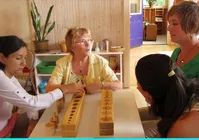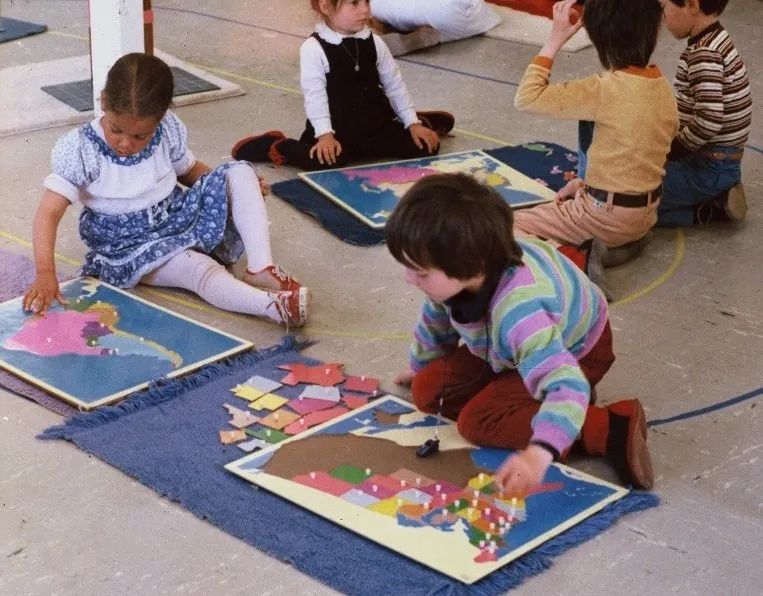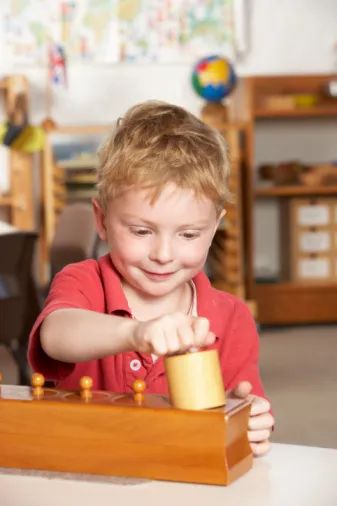Student Wisdom
One aspect of the online study is the final written exam. Students are given a number of topics that they can choose to write about. I am so thrilled with the deep understanding that many of the students have demonstrated that I want to include portions of several of their essays for you to read. I know these precious ones will be able not only to teach the children, but also to help the parents of children to understand more deeply what we are doing in the classroom and why.
 The purpose of this blog is to allow you to read for yourself a little bit of what you can understand when it is your turn to take the course, either to become a teacher with our certification course or to gain a deeper understanding of the principles of Montessori for your own personal growth, development and application with your own children. This second option, which we call the Information Course, does not require either the Intensive or the internship. Some students, especially certified teachers, just come for the Intensive.
The purpose of this blog is to allow you to read for yourself a little bit of what you can understand when it is your turn to take the course, either to become a teacher with our certification course or to gain a deeper understanding of the principles of Montessori for your own personal growth, development and application with your own children. This second option, which we call the Information Course, does not require either the Intensive or the internship. Some students, especially certified teachers, just come for the Intensive.

Montessori as Help to Life - by C.L., Boise, ID
The child’s job or purpose is to construct himself, and the Montessori Method of education assists and guides him through this construction of self. This in turn aids and helps life.
In Montessori education we view the child as a whole. We recognize that the child is following an internal drive or need, and in following this internal need he is developing his personality.
We as Montessori guides can help each child become the most amazing person he can become just by following a few simple things:
- Providing children with a beautifully prepared environment that allows them to freely and independently follow their internal guides to construct themselves.
- By observing the child, we will know what to put in their environment and we will also know what to present to the child.
- By presenting Grace and Courtesy, each child will develop a good foundation and understanding of what good choices are and develop the ability to make these choices.
- And as we go about our day, we model for the children a polite and respectful way.

Normalization -- by V.S., Nashville, TN
A normalized child is a happy child! Montessori believed in the child’s potential to learn, focus, and follow the inner teacher. When you experience a child who is normalized it is a sight to behold! But before we discuss the fruits of the normalized child, let us talk about what inhibits a child to becoming normalized. Montessori termed these as “deviations” because they literally keep a child from moving forward and create stumbling blocks for them.
- Uncontrollable energy – these are children who have a great need to move and interrupt others.
- Fantasy – these are children who are constantly in a fantastical world and have a highly developed imagination. They are creative yet lack discipline to finish a task. They often talk about and act out their fantastical games, and are challenged staying grounded in reality.
- Possessiveness – these children are more fixated on claiming the object or material instead of learning the concepts.
- Disorder – these children are in a constant state of disorder and lack the skill to keep their work areas tidy and neat. Personal hygiene is not important and they do not recognize their disorderly appearance.
- Overpowered will – these are children who constantly require adult approval and interaction. They do not trust their own intuition and therefore have trouble choosing for themselves due to adults overpowering them with what they want the child to do.
- Overpowering will – these are the children who overpower adults with their will and the adult allows them to do so. They are also in need of one-on-one connection from adults, and often overpower their peers when playing games or choosing group activities.
- Lying – these are children who lie as a way for others to see them and gain self-validation through their peers’ acceptance. They also lie as a way to safeguard their inner self personality, often due to emotional or physical abuse from an adult. Lastly, they may lie due to laziness and a disinterest in learning the truth.
- Fear – these children have unfounded fears passed down by adults (who mean well) who share moral stories that point out unrealistic consequences. For example, the story of Pinocchio tells us that when he lied, his nose grew and kept him made out of wood. Once he told the truth he became a real boy. These children fear and often have trouble making decisions for themselves.
Montessori tells us that the solution to these deviations is the child engaged in work. She strongly believed that a child who works can eliminate (or lessen) the deviations and produce the characteristics of a normalized child. Through cycles of concentrated activities, the child engages the senses and focuses on mastery of the work.
Normalization -- by K.H., Czech Republic
Normalization is a process when the child chooses a lesson, coordinating his movements by paying attention through his will: going to the shelf, picking a lesson, sitting at a table, controlling his movements to internalize order, working with concentration without being disturbed, and then putting the material back onto the shelf.
This is possible if there is a proper environment with age-appropriate, purposeful material provided and presented. Normalization happens at a point of attention and polarization when the child transforms himself from a clumsy, disorderly state to an orderly, composed, peaceful stage using his will, coordinating his movements and attaining a self-constructed internal peace.
Some of the characteristics that a normalized child can achieve are:
- Love for work
- Love for concentration
- Love for silence
- Joy of learning
- Love for order
- Liberty and independence

Education as Help to Life - M. A., Ph.D., New York
Any understanding of Montessori education as “help to life” is an education for life, an education where the child learns to do activities that not only serve for the rest of his life, but for his development and evolution.
Therefore, a prepared environment for the child is of extreme importance because it provides for the needs of the child. In a prepared environment children are attracted to do the activities that they need in order to gain coordination of movement, concentration, confidence and self-regulation. These activities help to bring order in their brain, establishing also a love for order as well as a love for work.
It is through work that children acquire their personality in accordance to their own energies. It is also a way that children learn to be independent. Montessori states that children by nature have love for order, work and perfection, and also love to educate themselves. Montessori also states that the children’s motto is “help me do it myself.” This way, children develop their own capacities that serve them for the rest of their life.
 Children possess their own inner teacher and in accord, Montessori put emphasis in freedom for children. They need to move in order to strive and they need to have freedom of choice, which is important for them to work on the activity that their psychic energy or spirit directs them to choose in order to develop well. Children need freedom to repeat any activity as many times as they need in order to satisfy their inner master. It is a way to develop concentration and inner discipline, which is important for self-development. Montessori gave great importance to the obedience of the inner master or psychic energy. She described it as a flame that propels children to do the right thing. It is for this reason that children need freedom. She wrote that discipline and freedom go hand in hand. Children need their inner guidance to establish inner discipline first in order to show it externally.
Children possess their own inner teacher and in accord, Montessori put emphasis in freedom for children. They need to move in order to strive and they need to have freedom of choice, which is important for them to work on the activity that their psychic energy or spirit directs them to choose in order to develop well. Children need freedom to repeat any activity as many times as they need in order to satisfy their inner master. It is a way to develop concentration and inner discipline, which is important for self-development. Montessori gave great importance to the obedience of the inner master or psychic energy. She described it as a flame that propels children to do the right thing. It is for this reason that children need freedom. She wrote that discipline and freedom go hand in hand. Children need their inner guidance to establish inner discipline first in order to show it externally.

Montessori noticed that children possess an absorbent mind that makes it easy for them to acquire knowledge of anything. Therefore, educators need to know how to help children to educate themselves.




















